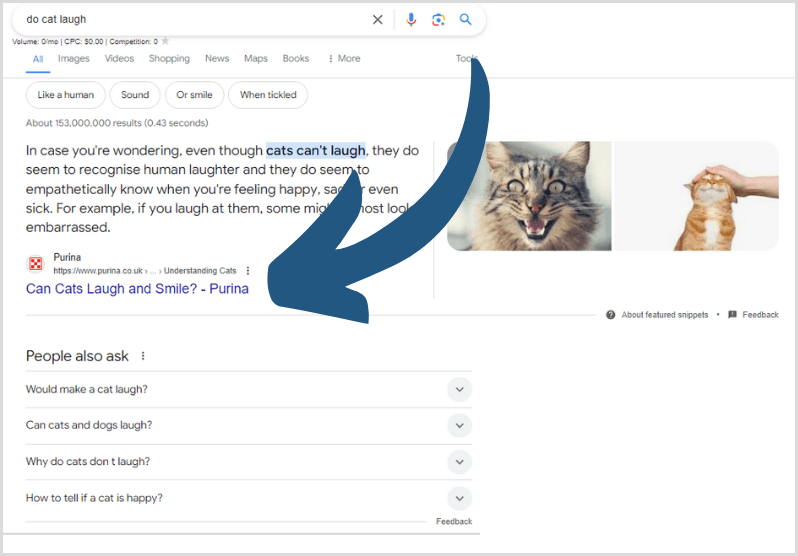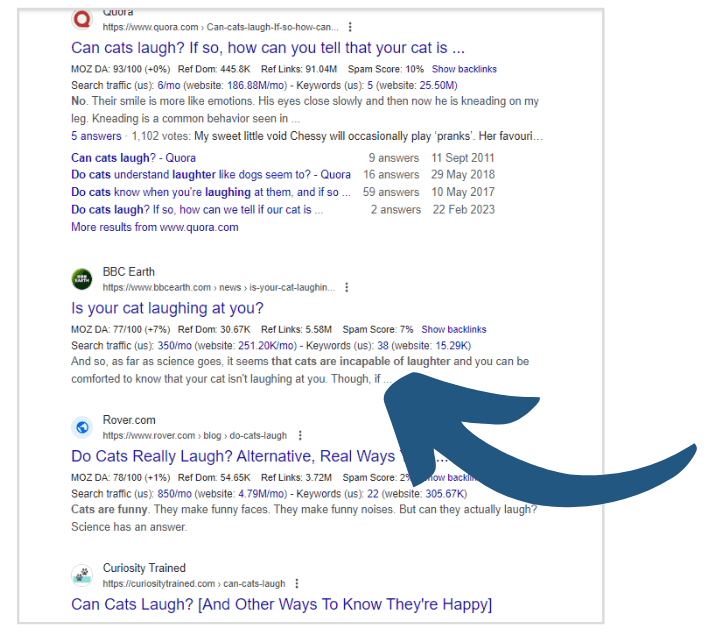-
 Published: Aug 9, 2024
Published: Aug 9, 2024
-
 8 min. read
8 min. read
-
 Celeste Yates
Celeste Yates Content Writer
Content Writer
- Celeste has worked in the online marketing space for twenty years. She has written for sectors including tourism, sustainability, education, lifestyle, food, and marketing. You can find her work featured by Green Building Media South Africa, Stodels Gardening, and The Post House Hotel. In magazines, you may have seen her in The Cape Times, Oprah South Africa, and The Property Magazine. While you can find her writing up on the latest SEO trends and exploring digital techniques during the day, her love of story-telling carries on in enriched games and books after hours.
There are many rumors and whispers on the Internet about this latest term, information gain, and how it affects search engine optimization (SEO). The basic concept of information gain in SEO is both a new concept and also kind of an old concept.
It is fairly new because this buzzword is connected to Google’s information score patent that was granted in June 2022. However, it is also old because it goes back to a concept that Google has been asking content creators to do since the beginning of the Internet: Create unique content.
Google has pushed this concept by laying down the law with other buzzwords over the decades, such as “Content is King” and the “E-E-A-T” way to create valuable content. Now, Google is back at it again, trying to lure writers away from regurgitating information with AI and, rather, create content that is unique and stands out in the search engine results pages (SERPS).
We’ll be looking at this term and how it can enhance your online strategy. Keep reading to learn more!
The definition of information gain in SEO
Information gain is an indication of how unique your content is compared to the consensus content on the web.
Imagine all the articles that come up for a specific search term on a search engine, then take all those articles and do an average content analysis.
Look at what the general content was about between all those top pages, and then delete it — the common information and anything that is similar between articles. Remove all of it, what would you be left with? What unique addition is left to make each individual article unique?
That information left would be considered the “information gain.” It is the extra, the X factor, the special ingredient.
Working with information gain score
Google’s patent describes a concept that SEO professionals need to know about: The information gain score. This outlines a user’s journey. Let’s look at this in a step-by-step format:
1. A user looks up a search term, like ‘do cats laugh?’ A list of search results appears, and the user clicks the first one at Purina.

2. However, perhaps the first search didn’t satisfy the user, and they wanted a second opinion. They scroll down and choose a second search result from BBC Earth.

3. This is where the information gain score comes in. The user will look at the page and see if there is more information to gain than on the first page. If the user finds it, that is the end of their journey, and they move on. If not, they will go to another search result. Google, on the other hand, is busy giving scores to these articles in terms of the additional information they provide.
If content creators are just looking at the top five articles of a search, compiling a new article out of that, and then posting it, there is no additional information or unique content added. Therefore, the score Google will give that article is low.
An example of this would be “best hats in the world.” Currently, articles on the SERPs might include the top 10 best hats. If you named the top 15, your article would give the user an information gain of five hats, so you are likely (not guaranteed!) to get a better score.
Be careful here, as additional doesn’t always mean more. A longer article that is full of information that isn’t useful to a user is considered less valuable than an article that is shorter but of better quality. It’s all about who is answering the user’s search query better.
What does information gain in SEO mean for content?
The speculation is that SEO and information gain algorithms are all focused on trying to separate the copy regurgitates on the Internet, such as mass-produced AI-generated content and content farms, from the actual experts and specialists creating quality content.
Content farms are companies that employ a large number of freelance writers to generate large amounts of low-quality content, often with the help of automated tools. They are not specialists or expert content writers.
Search engines also don’t penalize or ban the use of AI content. Challenges arise when content creators use it extensively, as it detracts from the quality, credibility, and reliability of the content.
The result of these SEO and information gain algorithms is that researchers will have to spend more time creating content to ensure they are bringing something unique to the table. While looking at what is currently available for targeted keywords in the SERPs can give a writer a starting point and even inspiration, it should only provide a skeleton of an outline at best.
You should think about what the user would want from a keyword or search term. What is the goal of your article? You will need to give it a unique spin, an interesting perspective, or maybe an unusual opinion — all of this needs to be backed up with some credibility.
If you are currently outsourcing your content to an external company, you will need to ensure that those content writers know what they are doing, but also that they know your industry. At companies like WebFX, for example, we have 100+ specialized writers that have experience writing in specific industries and know how to craft effective content.
Independent research from Clutch has named WebFX the
top SEO company in the United States.
Clutch has personally interviewed more than 250 WebFX clients to discuss their experience partnering with us.
Read More Clutch Reviews

5 strategies to enhance information gain in SEO and content
Originality is basically key here with SEO and information gain concepts. You need to look at your business and content strategy to think of how you can deliver content in a unique, fresh way while also including your brand’s voice. You don’t want to all of a sudden get on a soap box and deliver strongly opinionated pieces when your business needs sensitivity.
Here are a few great ways for you to get that information gained in your SEO strategy:
1. Share first-hand experiences
Nothing beats uniqueness like a first-hand experience. Don’t be afraid to share your content with first-person pronouns. What is great about this strategy is that, yes, you are giving a personal experience to make a search engine algorithm happy, but the reader will love it, too. Users relate to a personal experience rather than a fact or figure.
2. Humanize your content with emotion
Emotion is more likely to get a customer on your side than any logic will. It is something consumer brands often use in their advertising to get a person to connect with their products. If your business has a social impact, or you feel strongly about your customer service, then share it. Give your audience something to connect and relate to, and by doing so, you will add a unique twist to your content.
3. Find new content to give
Instead of looking at what all the other websites are doing in the SERPs, look to your customers for content. Testimonials and customer feedback is a treasure trove of unique information that you could be writing content about. Look for questions that might come up often or themes within your feedback you could write about.
Another great source is to create case studies. No other company would have had the same experience with that customer. It is totally unique to your company and their experience with it, which you can share on the web.
4. Search uniquely and get other input
If you are looking for interesting information to add to your article, consider going off the ‘Google Grid.’ While most people are looking for information and statistics on Google, consider using a different search engine to get fresh information.
You could search in journals, articles, or news websites. You could even go completely off-grid and consider looking at non-electronic formats. Reach out to an expert and get their input on the subject. You can ask co-workers, peers, or other specialists in the industry to provide their unique insights to provide a fresh perspective to your content.
5. Rich media
Maybe your twist isn’t about giving new insight into the information, but about delivering it in a new, different way. Consider thinking outside the (copy) box and using other interactive formats like audio, podcasts, video, infographics, or perhaps interactive media to showcase the information. Look into getting interactive content tools to help you get started.
Prepare for information gain in SEO with content created by WebFX’s specialists
Need help in creating content that is unique and original, so you can be ready for information gain? The content marketing experts here at WebFX are here to help.
With 25+ years of experience and a team of 100+ specialized content writers, all geared towards writing for your industry, you can be sure that originality is the focus of your content
Prepare for information gain by reaching out to us online or at 888-601-5359 today!
-
 Celeste has worked in the online marketing space for twenty years. She has written for sectors including tourism, sustainability, education, lifestyle, food, and marketing. You can find her work featured by Green Building Media South Africa, Stodels Gardening, and The Post House Hotel. In magazines, you may have seen her in The Cape Times, Oprah South Africa, and The Property Magazine. While you can find her writing up on the latest SEO trends and exploring digital techniques during the day, her love of story-telling carries on in enriched games and books after hours.
Celeste has worked in the online marketing space for twenty years. She has written for sectors including tourism, sustainability, education, lifestyle, food, and marketing. You can find her work featured by Green Building Media South Africa, Stodels Gardening, and The Post House Hotel. In magazines, you may have seen her in The Cape Times, Oprah South Africa, and The Property Magazine. While you can find her writing up on the latest SEO trends and exploring digital techniques during the day, her love of story-telling carries on in enriched games and books after hours. -

WebFX is a full-service marketing agency with 1,100+ client reviews and a 4.9-star rating on Clutch! Find out how our expert team and revenue-accelerating tech can drive results for you! Learn more
Try our free Marketing Calculator
Craft a tailored online marketing strategy! Utilize our free Internet marketing calculator for a custom plan based on your location, reach, timeframe, and budget.
Plan Your Marketing Budget

SEO Success with KOA

Proven Marketing Strategies
Try our free Marketing Calculator
Craft a tailored online marketing strategy! Utilize our free Internet marketing calculator for a custom plan based on your location, reach, timeframe, and budget.
Plan Your Marketing Budget
What to read next





